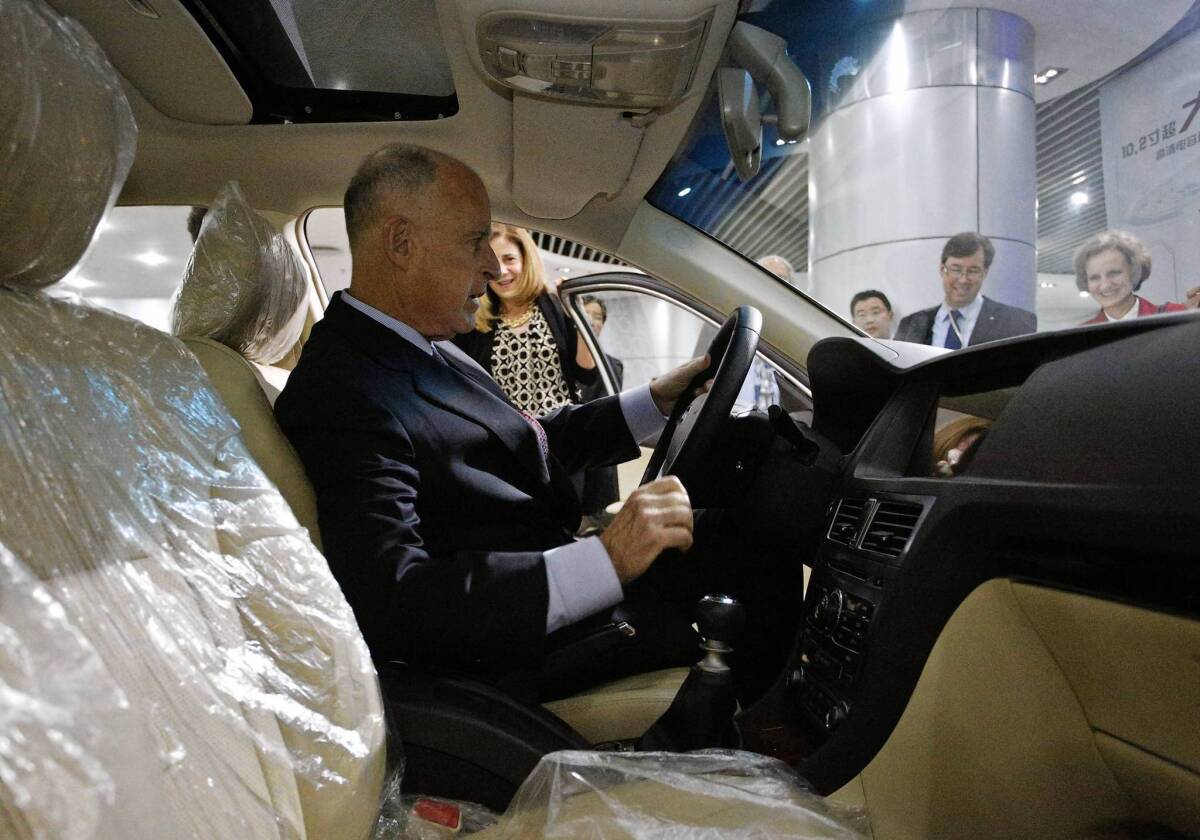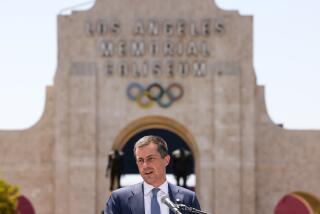Chinese firm to open bus factory in Lancaster

- Share via
SHENZHEN, China — Gov. Jerry Brown, visiting the headquarters of an electric car and bus manufacturer here, announced Tuesday that the company would open a factory in Lancaster, the first Chinese-owned vehicle plant on American soil.
The firm, Build Your Dreams, or BYD, will put 10 new plug-in buses on the streets of Long Beach beginning next year after assembling them in the Lancaster facility, with hopes of producing dozens more in coming years.
“It’s very significant,” said Brown, speaking in this southern port city on the last full day of his weeklong visit to China. “I think it’s very important that we start replacing the bus fleet with electric buses.”
The new buses, which BYD says can run up to 150 miles with a full passenger load on a single charge, will contain parts made mostly in China, where BYD has hundreds of buses on the road. Company officials say every vehicle produced in Lancaster will translate into one California job, in addition to the 40 or so people the company currently employs at the downtown Los Angeles headquarters of BYD America.
Opening ceremonies at the Lancaster plant are set for May 1.
Most Chinese investment in the U.S., according to expert Jock O’Connell of Beacon Economics, has tended to be in “high tech areas, where they are looking to tap into our commercial edge.” But experienced foreign firms that have thrived with the help of subsidies in their home countries are increasingly looking for ways to tap into the billions of dollars of public money available in the U.S., much of which is in California.
With increasingly strict air-quality rules and plenty of government subsidies available, the potential market for electric buses is sizable. As existing fleets age and buses with diesel engines are scrapped, public transit agencies will be shopping for thousands of eco-friendly vehicles in the next few years.
Electric ones are projected to play a central role in the shift to cleaner vehicles. The governor said the plans by BYD, in which billionaire investor Warren Buffet has a 10% stake, could help bring other green-vehicle manufacturers to the state.
After a company tour Tuesday, Brown stepped onto a model of an electric bus that will be assembled in California. As the vehicle rolled through the BYD campus, Brown grabbed an overhead bar and did a couple of pull-ups, to the delight of company officials who were along for the ride.
Brown and his wife, Anne Gust Brown, also looked at roughly a dozen electric and fuel-efficient cars made by the company, including a new hybrid automobile that BYD officials have dubbed “the Prius killer.” Brown was visibly impressed when company officials told him the new Qin auto gets 118 miles per gallon.
O’Connell said the new BYD factory could be a boon for California, where most new jobs have tended to be in high technology and professional occupations unsuited to the large slice of the population whose education stopped with a high school diploma.
“Typically this kind of facility goes into the right-to-work states, in the South, where the labor and the land costs are cheaper,” he said. “It’s a positive sign that a company would locate a manufacturing plant here in California.”
When Long Beach officials agreed last month to buy the 10 electric buses from BYD for $12 million, the announcement triggered fierce criticism from competitors who said U.S. taxpayer dollars should be spent with companies that are already building in the U.S.
A lawyer for one of BYD’s rivals for the Long Beach business, South Carolina-based Proterra Inc., fired off a 16-page letter to the city’s transit officials. BYD has “a history of overpromising and underdelivering,” wrote Proterra’s general counsel, Marc Gottschalk.
In 2011, when BYD announced its new Los Angeles-based office, funded with nearly $2 million in incentives from the city, it promised 150 employees in the downtown office by the end of the year. Today the company employs about 40 people, according to BYD America Vice President Michael Austin, who dismissed Proterra’s complaints as sour grapes.
“I was very disappointed to see Proterra take such a negative view of what was a fair competitive bid process,” he said.
Questions about the safety of BYD’s electric car surfaced in China last year after one was involved in a fiery crash that killed three people. And the company has yet to go through a series of rigorous safety and performance tests to meet standards for vehicles on California roads.
In addition, it remains to be seen whether buses fully powered by electricity will win the race for cleaner vehicles. They are more expensive than those powered by diesel or compressed natural gas — about $1 million each, compared with about $500,000 for a new CNG or diesel bus, according to manufacturers.
Times staff writer Ronald D. White in Los Angeles contributed to this report.
More to Read
Sign up for Essential California
The most important California stories and recommendations in your inbox every morning.
You may occasionally receive promotional content from the Los Angeles Times.










